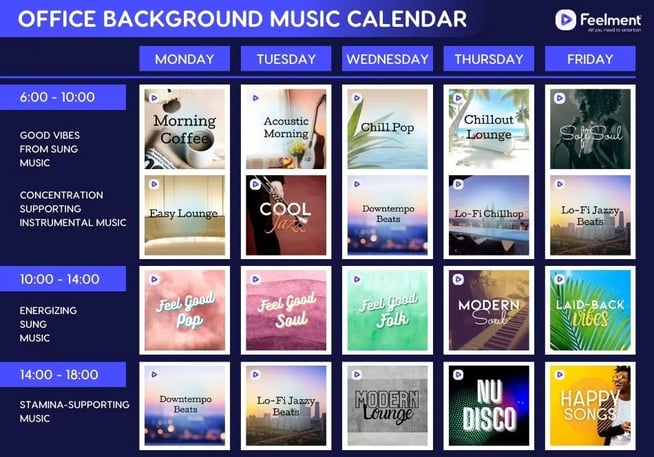Many of us can relate to a situation where fast-paced and energizing music adds an extra boost when fatigue sets in. Or perhaps how the background music guides you to immerse yourself in what you're doing, leading to a state of flow. Music has a significant impact on human energy levels, and for this reason, background music is worth utilizing in a work environment as well. By adding work-supportive background music to office spaces, you can directly influence productivity.
The impact of background music in the workplace
Carefully chosen background music has been proven to increase efficiency and enhance focus in the workplace. Background music also serves as an excellent sound muffler, as nothing is more frustrating than losing concentration due to the sounds of colleagues or the surrounding environment. Introducing background music to the workplace provides a connection to an employee's personal life and creates a sense of security—just what we need after the past few years. In addition to various interior design solutions, music can also be used to designate different areas of use, such as working spaces and break areas in the office. This way, the work environment becomes a place where working spaces support focus and break areas support recovery.
Tips for choosing background music in the office
When selecting background music for office space, it's good to consider playlist targeting in addition to space design, based on different times of the day. In the morning, people crave a calm awakening, and relaxing music supports the just-awakened state. It's important to avoid an overly energetic sound environment, as it may cause a shock to the system. During lunchtime, choosing music that promotes recovery is beneficial to momentarily shift focus from work matters. For this purpose, more familiar song choices that resonate with the employee's personal life are suitable. ”Partly instrumental music supports concentration, while partly sung music provides awakening stimuli.”
During the lunch break and afterward, it's advisable to favor slightly more energetic and stamina-supporting music. Upbeat music combined with instrumental tracks helps maintain focus and alleviates post-lunch fatigue. For the late-afternoon sessions towards the end of the week, it's good to target slightly different playlists compared to the beginning of the week, as the approaching weekend influences the employee's energy levels and concentration. Background music can guide the employee towards leisure time, sustaining an alert state and facilitating recovery from work.
The office background music weekly calendar
Our music expert Matti designed an example of an office background music calendar, featuring playlist recommendations for different days of the week and times of the day.
Morning 6:00 – 14:00
The playlists include awakening, calm, and positive music. In the morning playlists, there are two different options: uplifting sung music and concentration-supporting instrumental music.
Lunch time 10:00 – 14:00
The playlists emphasize cheerful and sung music, providing energy for the lunch break and the rest of the day.
Afternoon 14:00 – 18:00
In the early-week afternoons, instrumental playlists that support focus and efficiency are favored, featuring smoothly rolling music with a steady beat. As the week progresses, the late-afternoon sessions call for energy and a nod to the approaching weekend, so playlists with sung songs are included. Thursday's playlist supports efficiency with less-known tracks, while Friday's includes hits that evoke a weekend vibe. This way, employees can stay focused on work for a few more hours.

We are happy to provide more information about background music for office spaces, so feel free to contact us.
Also, remember music licenses! Playing background music in a staffed area requires a music license if there are 25 people or more working in the space.